
 BENEDICT XVI IN CARPINETO
BENEDICT XVI IN CARPINETO
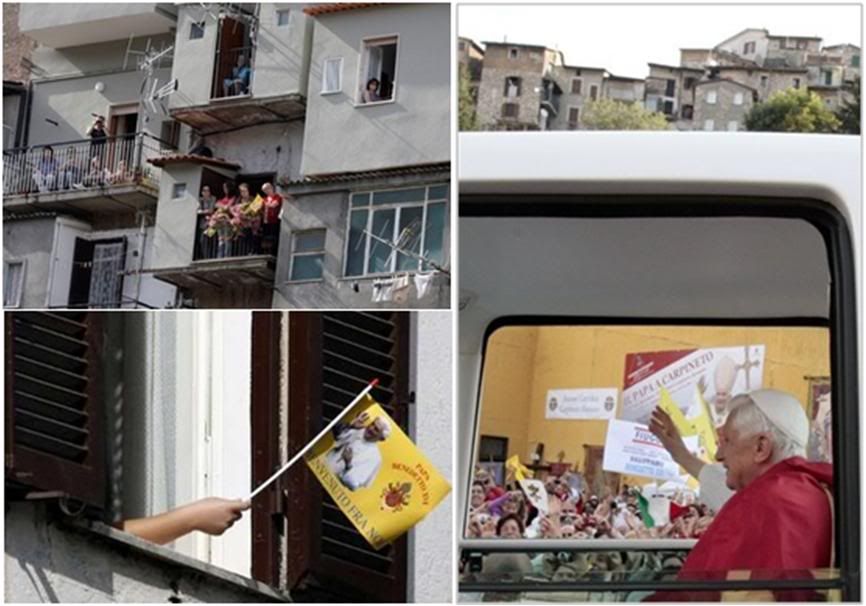
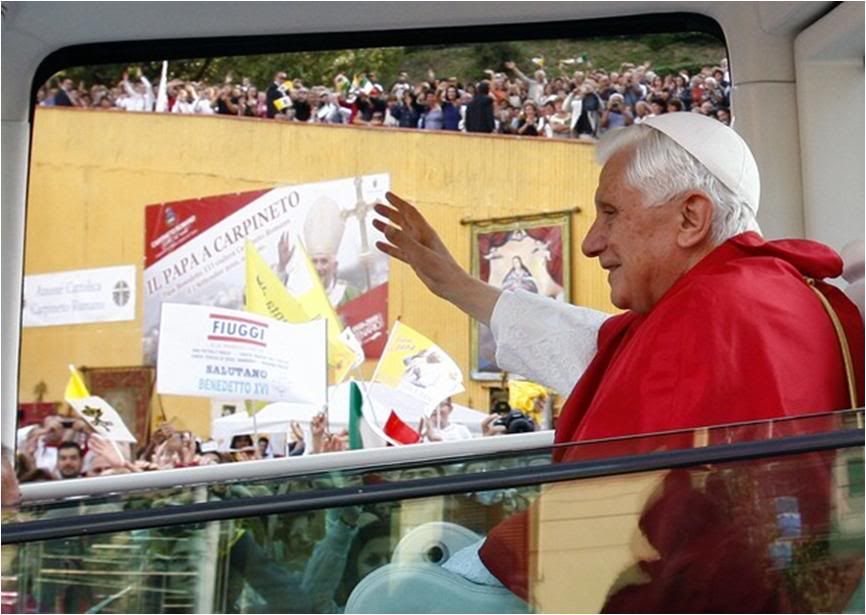
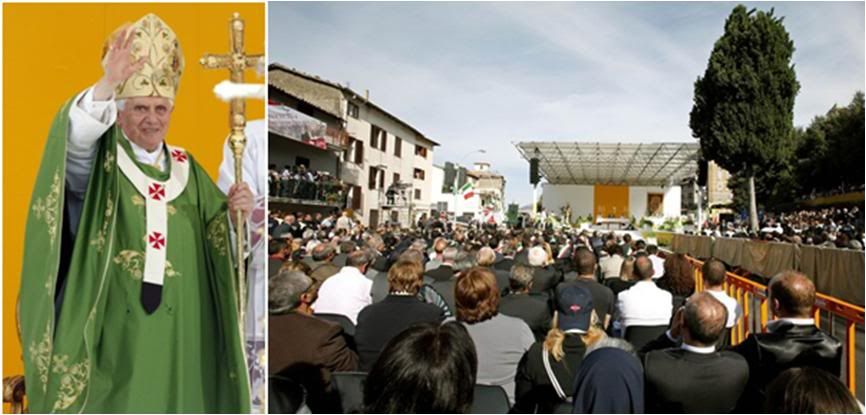
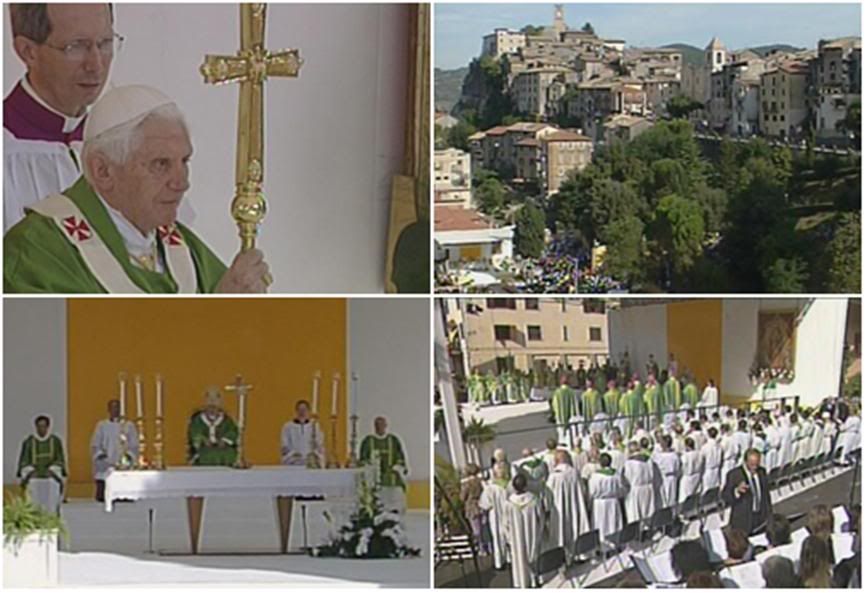
Dear brothers and sisters,
First of all, allow me to express my joy to be among you here in Carpineto Romano, in the footsteps of my beloved predecessors Paul VI and John Paul II.
And the occasion that brings me here is equally joyful: the bicentennial of the birth of Pope Leo XIII, Vincenzo Gioacchino Pecci, born in this beautiful place on March 2, 1810. I thank you all for your welcome.
In particular, I thank the Bishop of Anagni-Alatri, Mons. Lorenzo Loppa, and the Mayor of Carpineto, who formally welcomed me before the Mass, along with all the other authorities present.
I address a special thought to the young people of the diocese, particularly those who have completed the annual diocesan pilgrimage.
Unfortunately, my visit will be brief but it is focused on this Eucharistic celebration - in which we find everything: the Word and the Bread of life, which nourish faith, hope and charity, and we renew the link of communion which makes us the only Church of our Lord Jesus Christ.
We have heard the Word of God today, and it is natural to listen to it under these circumstances, by thinking about the figure of Pope Leo XIII and the legacy he has left us.
The main theme that emerges from the Bible readings today is the primacy of God and Christ. In the Gospel passage taken from St. Luke, Jesus himself states frankly three conditions necessary in order to be his disciple: to love him more than any other person and life itself; to carry one's own Cross and follow him; and to renounce all of one's possessions.
Jesus saw a great crowd following him and his disciples, and he wanted it clear to everyone: Following him is a demanding task and cannot depend on enthusiasm and opportunism - it must be a well-considered decision, taken after having asked one's conscience: Who is Jesus for me? Is he truly 'the Lord', does he occupy the first place, like the Sun around which all other planets revolve?
The first Reading from the Book of Wisdom indirectly suggests to us the reason for the absolute primacy of Jesus Christ: In him are found the answers to the questions man asks in every time when seeking the truth about God and about himself.
God is beyond our reach and his designs are inscrutable. But he wished to reveal himself in creation, but above all, in the story of salvation, until he fully manifested himself and his will in Christ.
Even if it remains true that "no one has ever seen God" (Jn 1,18), now we know his 'name', his 'face', and even his will - because these have been revealed to us by Jesus, who is the Wisdom of God made man.
"You had given wisdom and sent your holy spirit from on high," writes the author of the first Reading, "And thus were the paths of those on earth made straight" (Wis 9,17-18).
This fundamental statement in the Word of God makes us think of two aspects of the life and ministry of your venerated compatriot whom we commemorate today, the Supreme Pontiff Leo XIII.
Before everything, it must be underscored that he was a man of great faith and profound devotion. For every Christian, including the Pope, this always remains the basis of everything.
Without prayer, that is, without interior union with God, we cannot do anything, as Jesus said clearly to his disciples at the Last Supper (cfr Jn 15,5).
The words and actions of Papa Pecci reveal his intimate religiosity - and this found a correspondence in his Magisterium: Among his numerous encyclicals and Apostolic letters, like the thread of a necklace, are those of a specifically spiritual character, dedicated above all to increasing Marian devotion, especially through the Holy Rosary. These constitute a veritable catechism that spans his 25-year Pontificate from its beginning to the very end.
But we also find documents on Christ the Redeemer, on the Holy Spirit, on consecration to the Sacred Heart, on devotion to St. Joseph and to St. Francis of Assisi. Leo XII was particularly linked to the Franciscan family, and he himself had belonged to its Third Order.
I like to consider all these diverse elements as facets of a single reality: love of God and Christ, before which nothing must be placed. This first and principal quality was assimilated by Vincenzo Gioacchino Pecci here, in his birthplace, from his parents, from his parish.
There is also a second aspect that derives from the primacy of God and Christ, which can be found in the public activities of every Pastor of the Church, particularly, those of the Supreme Pontiff, with the characteristics proper to each individual personality.
i would say that the very concept of 'Christian wisdom', which already emerged in the first Reading and the Gospel today, offers us the synthesis of Leo XIII's vision - which, not accidentally, also constitute the first words of one of his encyclicals.
Every pastor is called on to transmit to the People of God not abstract truths, but a 'wisdom', that is, a message that unites faith and life, truth and concrete reality.
Pope Leo XIII, with the assistance of the Holy Spirit, was able to do this in a historical period that was one of the most difficult for the Church, remaining faithful to Tradition, and at the same time, measuring up to the great open questions of the day.
And he succeeded precisely through 'Christian wisdom', based on Sacred Scripture and the immense theological and spiritual patrimony of the Catholic Church, as well as on the solid and limpid philosophy of St. Tomas Aquinas, whom he appreciated very highly and whose thought he promoted throughout the entire Church.
At this point, after considering the basis - namely, the faith and spiritual life, and therefore, the general context for the message of Leo XIII - I can now emphasize his social magisterium, made most famous and timeless by the encyclical Rerum novarum, but rich with many other interventions that make up an organic body, the nucleus of the social doctrine of the Church.
Let us take note of St. Paul's letter to Philemon, which happily the liturgy also proposes today. It is the briefest text in the entire Pauline epistolary. Once when in prison, the Apostle had transmitted the faith to Onesimus, a slave originally from Colossus who had escaped from his mater Philemon, a rich inhabitant of that city, who had become Christian along with his family, thanks to Paul's preaching.
Now, the Apostle writes Philemon inviting him to accept Onesimus back, not as a slave but as a brother in Christ. The new Christian brotherhood overcomes not only the separation between slaves and freemen, and triggers off in history the principle of promoting individuals that would lead to the abolition of slavery, but also overcomes all other barriers that separate men even now. Pope Leo XIII, in fact, dedicated his encyclical Catholicae Ecclesiae of 1890 to the issue of slavery.
From this experience of St. Paul with Onesimus, we can start an ample reflection on the impulse for human promotion that Christianity has contributed to civilization, and even on the method and style of this contribution, along the evangelical images of the seed and yeast.
Within the reality of history, Christians, acting as individuals or as a group, constitute a beneficial and peaceful force for profound change. This is the form of presence and activity in the world that is proposed by the social doctrine of the Church, which always aims at the maturation of conscience as a condition for valid and lasting transformations.
Now we must ask ourselves: What was the context into which, two centuries ago, was born the child who would become, 68 years later, Pope Leo XIII?
Europe was still undergoing the consequences of the great Napoleonic upheaval which followed the French Revolution. The Church and numerous expressions of Chinese culture were held severely to question. One thinks, for instance, of the attempt to set the date no longer counting from the birth of Christ but from the start of the revolutionary era, or of the mass removal of saints' names from calendars, from streets, from towns and villages...
The people of the countryside were certainly not in favor of such radical changes and remained linked to their religious traditions. Daily life was harsh and difficult - health conditions were terrible and food was scarce.
Meanwhile, industry was developing, and with it, the labor movement, which became ever more politically organized. The Church Magisterium, at its highest level, was impelled and aided by reflections on local conditions to elaborate a comprehensive overview and perspective of the new society and its common good.
Thus, when Leo XIII was elected Pope in 1878, he felt called on to bring this to completion, in the light of his wide knowledge with its international breadth, but also of so many initiatives already achieved 'in the field' by Christian communities and by men and women of the Church.
There were, in fact, dozens of saints and blesseds, from the end of the 18th century to the start of the 20th, who sought to find, simply with the imagination of charity, multiple ways to realize the Gospel message within the new social realities.
Doubtless it was these initiatives, with the sacrifices and reflections of these men and women, who prepared the ground for Rerum novarum and Papa Pecci's other social documents.
Already, from the time that he was Apostolic Nuncio in Belgium, he understood that the social question could be met positively and effectively through dialog and mediation. In an era of bitter anti-clericalism and inflammatory demonstrations against the Pope, Leo XIII was able to lead and sustain Catholics along the path of constructive participation in society - rich in content, firm in principles and capable of openness.
Shortly after Rerum novarum was published, there was an authentic explosion of social initiatives in Italy and other industrial countries: associations, rural banks, workers' banks, newspapers - a vast 'movement' which, in Italy, had an enlightened animator in the Servant of God Giuseppe Toniolo.
A Pope who was quite old, but wise and far-sighted, was thus able to bring a rejuvenated Church into the 20th century, one that had the right attitude to face the century's new challenges.
He was a Pope who was still politically and physically 'imprisoned' in the Vatican [under the terms imposed by the state of Italy upon its reunification and constitution in 1860], but in fact, with his Magisterium, he presented a Church capable of confronting, without any complexes, the great questions of contemporary society.
Dear friends in Carpineto Romano, we do not have time to go deeper into these statements. The Eucharist that we are celebrating, the Sacrament of Love [sacramentum caritatis], calls our attention to what is essential: charity, the love of Christ which renews men and the world.
This is the essential, and we see it well - we can almost perceive it - in the expressions St. Paul uses to Philemon. In that brief letter, one can, in fact, feel all the gentleness and, at the same time, the revolutionary force of the Gospel. We can observe the discreet and irresistible style of charity, which, as I wrote in my own social encyclical Caritas in veritate, is "the principal driving force behind the authentic development of every person and of all humanity" (No. 1).
With joy and affection, I leave with you the ancient but ever new commandment: Love each other as Christ loved us, and with this love, you will be salt and light for the world. Thus, you will be faithful to the legacy of your great and venerated compatriot, Pope Leo XIII.
May it be so in all the Church. Amen!
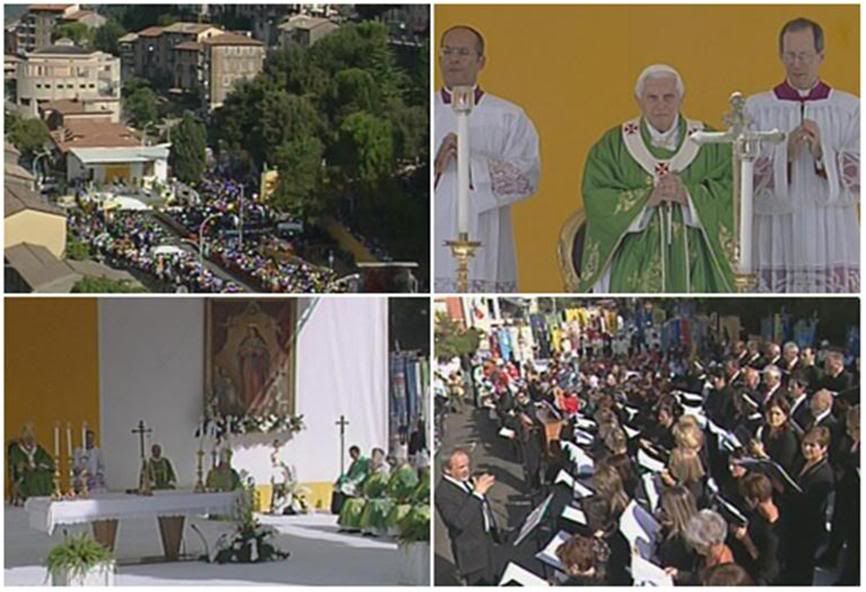 'Everyone, including Popes,
'Everyone, including Popes,
is called to prayer'

Carpineto Romano, Italy, Sep 5, 2010 (Adapted from CNA).- “Without prayer … we can do nothing”, said the Pope while honoring the legacy of Leo XIII today in his predecessor's hometown.
Joining this year's Leonine Year celebrations marking the 200th anniversary of Leo XIII's birth, Benedict XVI recalled his predecessor's faith, devotion and social teaching, saying that all people, including Popes, are called to pray and to love.
Using the chalice and the pectoral cross of Leo XIII himself, Pope Benedict XVI celebrated the Eucharist with 5,000 people in the center of the small mountain town of Carpineto Romano on Sunday morning.
The town, founded nearly a millenium before Christ, provided a stunning backdrop as well as a familial atmosphere, further augmented by the many townspeople followed the Mass from the balconies of their hillside stone houses.
In his homily, Benedict XVI reflected on two aspects of the late-Pope's life brought to mind by Jesus's call in the Sunday Liturgy to love Him above all others, to take up one's cross, and to leave behind material possessions.
The first element, he said, is the faith and devotion of Leo XII, whose papacy from 1878 to 1903 made him the last Pope of the 19th century and the first of the 20th.
“This,” he explained, “always remains the foundation of everything, for every Christian, including the Pope. Without prayer, that is, without interior union with God, we can do nothing.”
The call to social action for every priest, “in particular the Supreme Pontiff,” was the second aspect he noted. He said that each pastor is called to do so according to his individual personality and characteristics.
Each one, he said, has the vocation of transmitting 'wisdom' to the People of God, “a message that conjugates faith and life, truth and concrete reality.”
This, the Pope pointed out, is what Leo XIII did through his life and especially in writing the “first nucleus” of the social doctrine of the faith, the 1891 encyclical
Rerum Novarum.
Benedict XVI referenced it in his own 2009 encyclical,
Caritas in Veritate, in which he updated the Church's social teaching, as other Popes have done since Leo XIII.
Concluding his homily, Pope Benedict XVI insisted that through the Eucharist humanity continues to be urged to love for our neighbor. "The Sacrament of love,” he said, ”calls us back to the essential: charity, love of Christ that renews men and the world …”
Calling on the residents of Carpineto to practice the “ancient and always new” commandment of loving each other as Christ has done, he said, “(i)n this way you will be faithful to the inheritance of your great and venerated co-citizen, Pope Leo XIII.”
Echoing this call to the world, he said, “May it be so in all the Church!”
[Modificato da TERESA BENEDETTA 05/09/2010 20:00]